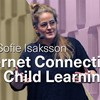mobilen
The fast and furtive spread of AI by infusion into technologies that we already in use – a critical assessment
In Hanemaayer, A. (editor) Artificial Intelligence and Its Discontents. Palgrave. Abstract AI has often reached individuals covertly, rather than by their own choosing. Standard automatic version update
Articles in Framtider International edition 2008
The purpose of this edition is to describe the changes in the Swedish model in a broad sense, and discuss it with an eye to current dilemmas and future challenges. Contents End of Equality? The Welfare Joakim Palme, Johan Fritzell and Åke Bergmark
Ann-Sofie Isaksson: Internet Connectivity and Child Learning: Evidence from Sub-Saharan Africa.
Venue: Institute for Futures Studies, Holländargatan 13 in Stockholm Research seminar with Ann-Sofie Isaksson, researcher in development economics, based at the Institute for Futures Studies (IFFS) and

Sakli(g)t 2024: Sveriges första sakprosafestival
Sakli(g)t is Sweden's first festival of literary non-fiction, organized by the Rikstolvan cultural centre outside Simrishamn in collaboration with the Institute for Futures Studies and Linnaeus UniverGiven the central role of non-fiction as a knowledge-transmitting link between science and the public, Sweden needs an arena where the narrative non-fiction book is the focus of in-depth discussions on the politically increasingly hot issues of facts, truth, narrative, reality and how form and aesthetics affect both knowledge itself and what knowledge becomes viable in today's technologically mobile media landscape. Such meeting places for producers and consumers of the documentary genre have long existed in the neighboring Nordic countries, but have not yet existed in Sweden.This year's program includes author talks with Åsa Wikforss, Nicolas Lunabba, Saga Cavallin, Johan Hilton, Lyra Ekström Lindbäck, Gudrun Schyman, Lasse Berg and Elena Kostiutjenko. In total, 50 authors will appear at the festival. Read the . Get .Together with Rikstolvan, the Institute is a co-founder of the festival, which was launched last year. A permanent establishment of the festival has been made possible with funds from the Institute for Futures Studies, Linnaeus University, the Nature & Culture Foundation, the Swedish Academy, the Swedish Arts Council, Simrishamn Municipality and Region Skåne.

Eyewitness video and human rights practice
This project will study the interplay between eyewitness videos in a digital media landscape and human rights practice.

Kari Andén-Papadopoulos
I am a Professor in Media and Communication Studies at the Department of Media Studies, Stockholm university. My research broadly concerns the role of news and documentary images and image practices i

Ann-Sofie Isaksson: Internet Connectivity and Child Learning
By facilitating access to information and educational materials for students, parents, and teachers alike, internet connectivity can help circumvent severe constraints on human capital accumulation in
Deep learning diffusion by infusion into preexisting technologies - Implications for users and society at large
in: Technology in Society. 63, 101396 Abstract:Artificial Intelligence (AI) in the form of Deep Learning (DL) technology has diffused in the consumer domain in a unique way as compared to previous gene, i.e., by being added to preexisting technologies that are already in use. We find that DL-algorithms for recommendations or ranking have been infused into all the 15 most popular mobile applications (apps) in the U.S. (as of May 2019). DL-infusion enables fast and vast diffusion. For example, when a DL-system was infused into YouTube, it almost immediately reached a third of the world's population. We argue that existing theories of innovation diffusion and adoption have limited relevance for DL-infusion, because it is a process that is driven by enterprises rather than individuals. We also discuss its social and ethical implications. First, consumers have a limited ability to detect and evaluate an infused technology. DL-infusion may thus help to explain why AI's presence in society has not been challenged by many. Second, the DL-providers are likely to face conflicts of interest, since consumer and supplier goals are not always aligned. Third, infusion is likely to be a particularly important diffusion process for DL-technologies as compared to other innovations, because they need large data sets to function well, which can be drawn from preexisting users. Related, it seems that larger technology companies comparatively benefit more from DL-infusion, because they already have many users. This suggests that the value drawn from DL is likely to follow a Matthew Effect of accumulated advantage online: many preexisting users provide a lot of behavioral data, which bring about better DL-driven features, which attract even more users, etc. Such a self-reinforcing process could limit the possibilities for new companies to compete. This way, the notion of DL-infusion may put light on the power shift that comes with the presence of AI in society.
Janine Wedel: Meet the new influence elites. How top players sway policy and governing in the twenty-first century
Janine R. Wedel is a university professor in the School of Public Policy at George Mason University and a Senior Research Fellow of the New America Foundation. ABSTRACTA new breed of influence elite ha
Three days of separation
The idea that we are only six introductions away from any other person on this planet is both beautiful and compelling. It has inspired research, provided inspiration to a film starring Will Smith and.








